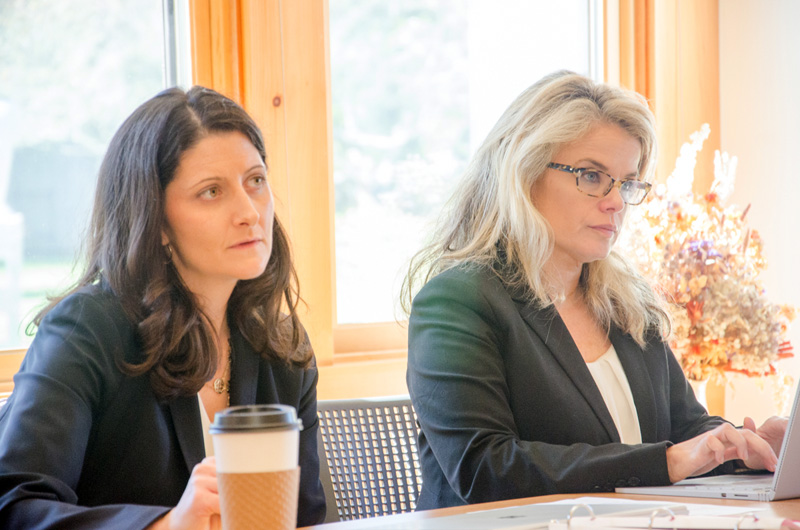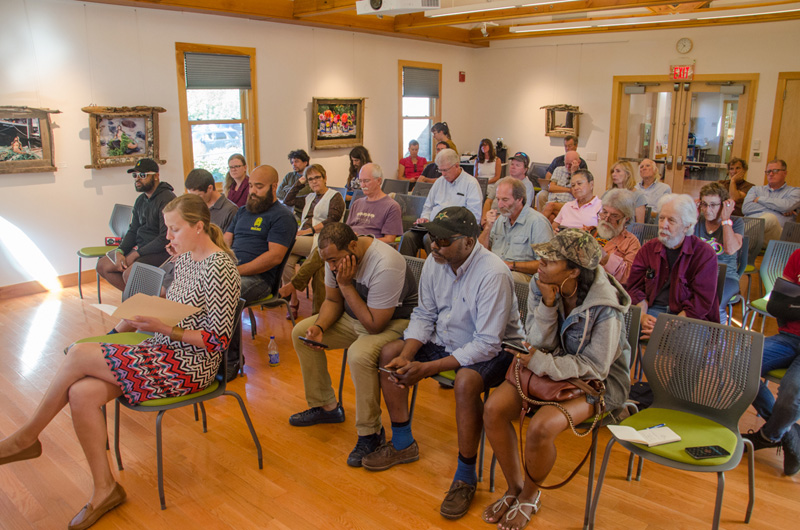Two members of the newly-appointed Massachusetts Cannabis Control Commission traveled to the Vineyard Tuesday to listen to the thoughts and ideas of Islanders, as the state crafts new regulations for recreational marijuana.
Commissioners Kay Doyle and Britte McBride hosted the listening session at the West Tisbury Library, attended by about 50 people.

Last November, Vineyard voters joined their counterparts in the commonwealth, approving a ballot question legalizing recreational marijuana. All six Island towns voted in favor of the initiative.
“The public listening session is for us to listen to you,” said Ms. McBride. “We won’t be answering questions today. We’re here to listen to your concerns and any issues that you want addressed in the regulations that we have been tasked with drafting.”
First to address the forum was Martha’s Vineyard legislative liaison Kalea Moore, speaking for state Sen. Julian Cyr and state Rep. Dylan Fernandes. Like other speakers to follow, Ms. Moore stressed how geography creates challenges for the Island. Transporting any amount of marijuana to the Island by sea or air is a violation of federal law, and those who do so risk arrest by federal law enforcement authorities.
“The Island requires special accommodations that may not be applicable to the rest of Massachusetts,” Ms. Moore said. “The Islands may be the only place in the state that are forced to grow their own marijuana because federal law may restrict large growers from sending their products to the Vineyard and Nantucket.”
She urged the state commission to promulgate regulations that allow the Islands the same access to marijuana as the rest of the state. “Cookie-cutter state policy often does not fit the unique geography of Dukes and Nantucket counties,” Ms. Moore said.
Island resident Thaw Malin 3rd urged the commission to allow the sale of marijuana seeds and increase the limit of 12 plants per household in the ballot referendum passed by voters last fall. He also advocated use of marijuana in public places such as beaches and parks.
“Right now in Massachusetts we have no place you can smoke except in your own house,” said Mr. Malin. “I think this is ridiculous. We should have a place, all around the state, where we can smoke that’s not just in our house.”
Beau Henderson of Oak Bluffs hopes to get a license to operate a recreational marijuana dispensary.
“I want to address how Cannabis Control Commission is making sure that minorities are represented in regard to licensure in Massachusetts, and specifically on-Island,” he said. “I’m here to make sure that our strong tax base on this Island is not overlooked.”
He also advocated for enough retail outlets to make marijuana readily accessible to all, as a way to mitigate the opioid epidemic.
Several speakers urged the commission to be cautious about legal marijuana getting into the hands of underage users. Among them was Theresa Manning, co-coordinator of the Martha’s Vineyard Youth Task Force, formed in 2004 to educate school-aged kids about alcohol and drug abuse.
“While our coalition does not have a position at all against medical or recreational marijuana, our hope is that as the state considers the regulations, there is a strong emphasis on reducing youth access to marijuana,” said Ms. Manning. “We have very high rates of use, currently.”
She pointed to a 2016 survey of Vineyard high school students that found 34 per cent used marijuana, well above the state average of 24 per cent and the national average of 22 per cent.
“Adult use is not a concern to me whatsoever, or our coalition,” Ms. Manning said. “The emerging brain research about the impacts for mental health and addiction issues for young people starting early, we care about that very much.”
Chris Egan of West Tisbury urged the commission to preserve the rights of those who do not use medical or recreational marijuana. He opposes a medical marijuana grow facility slated to be built in West Tisbury and operating by next fall.
“These laws and regulations that we are creating right now are catering to and providing opportunities for a minority of our population,” said Mr. Egan. “It’s going to affect all the population, but we need to keep that in mind. There’s a growing concern in town about our unique Island situation, allowing a streamlined opportunity for the medical marijuana facility to migrate to recreational supply and distribution. This could very much create a tax on our local social and safety services. I urge you to take it slow and conservatively.”
The state law allows possession of up to one ounce of marijuana by people 21 and over, with the right to grow up to six plants.
Up to 10 ounces and 12 plants are allowed per household.
The state legislature later modified the law, among other things raising the tax charged on marijuana sales from 3.75 per cent to 10.75 per cent. Once the 6.25 per cent state sales tax is added in, marijuana sales will be taxed at 17 per cent. Each town where marijuana is sold will have a local option to add an additional two or three per cent tax.
The legislature also delayed implementation of the law to July 1, 2018.
The Cannabis Control Commission began accepting applications for retail recreational dispensaries this month. The commission expects to take at least a year to develop regulations.








Comments (4)
Comments
Comment policy »